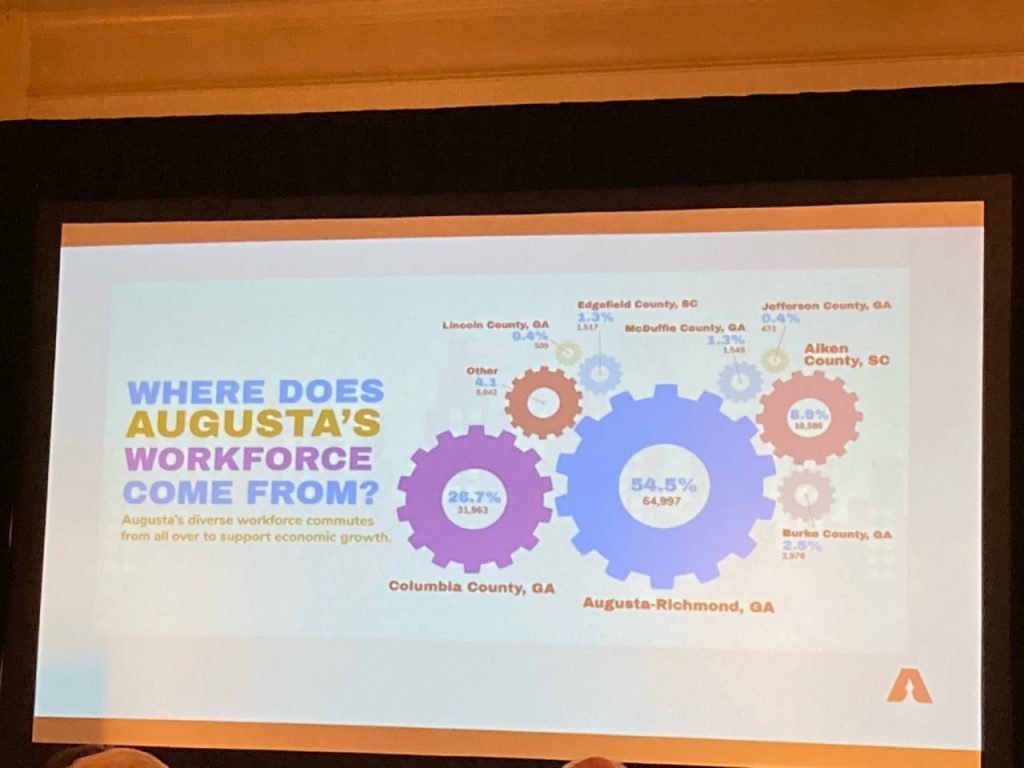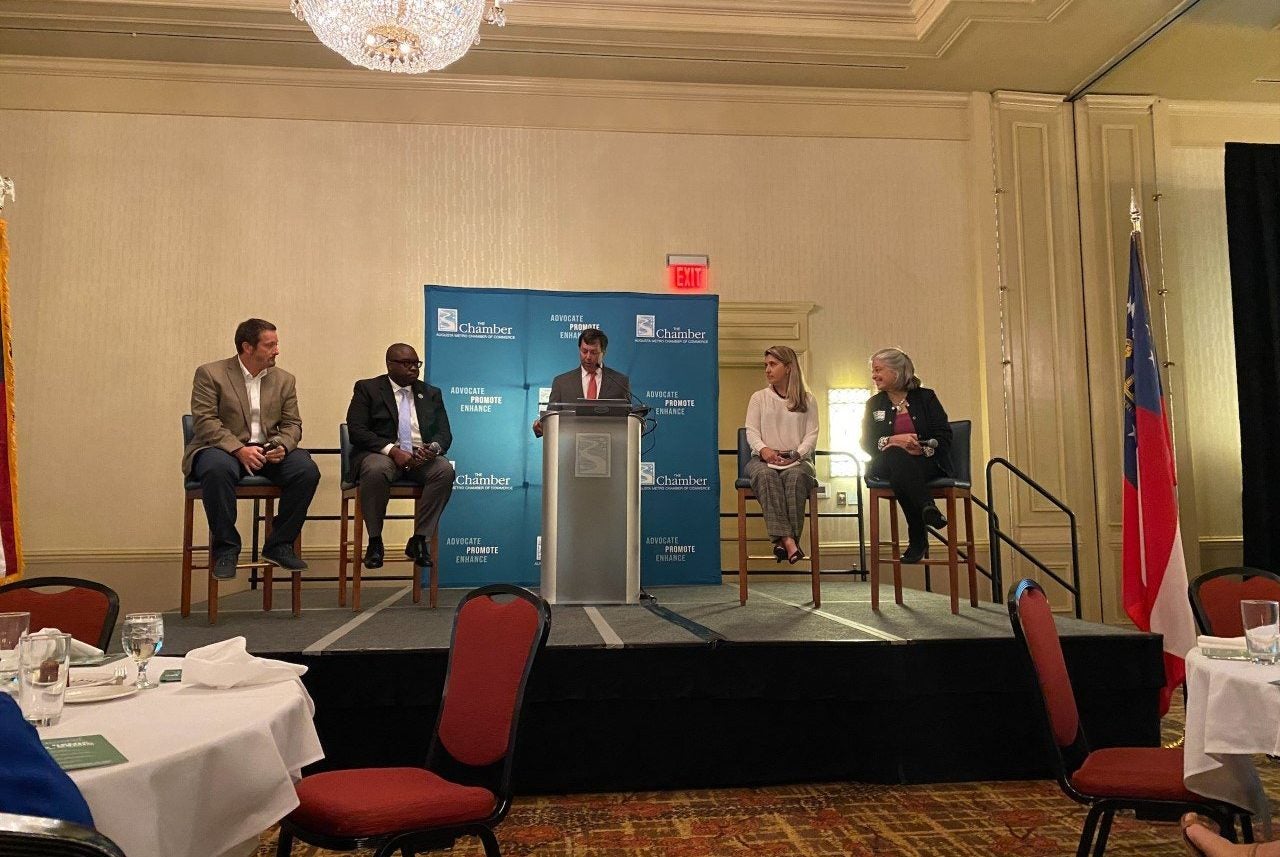A panel of business leaders gathered at the Sept. 29 Augusta Metro Chamber Member Economic Luncheon to answer questions and discuss strategies to better find thousands of Augustans who are either looking for work and can’t find it or have given up looking.
The panel was made up of Cal Wray, president of the Augusta Economic Development Authority; Dr. Jermaine Whirl, president of Augusta Technical College; Brittany Burnett; president of the United Way of the CSRA; and Mary Hayes, founder of WorkBay.
“In Richmond County, there are 202,000 people. We have 34,000 not in the labor force and not looking for a job. That’s Richmond County alone,” Wray said in his opening remarks. “These are people aged 15-64 that are not institutionalized and not actively looking for a job.”
Burnett pleaded with the attendees to rethink their approach when it comes to attracting applicants.
MORE: Staffing Shortage Hitting Area Restaurants Hard
“My challenge is to think like the people you are wanting to hire. You are not trying to hire a clone of yourself. We need to meet these people where they are,” Burnett said. “On average, for an unemployed 18-24 year old out there, it costs us about $5,000 in lost tax revenue. The average cost of an in-state college tuition here in Georgia costs about $4,700. It it less expensive to send someone to school so they can earn the credentials to secure a living wage than it is for someone to be unemployed. We have to get creative in connecting with these people.
Hayes said, “The U.S. Chamber Foundation asked educators, ‘Are you preparing your students for the careers that they want?’ The vast majority said, ‘Yes.’ The vast majority of employers said, ‘No, we are not being provided with the candidates we need for the jobs we are hiring for.’ This disconnect is what we’re trying to solve here. The easiest way to measure retention in our companies is speed to safety, speed to performance and speed to engagement. Our employees need to feel safe on the job, feel like they know what they’re doing and we need to ask if our employees have friends at work. Is there a community, a culture?”
[adrotate banner=”19″]
Hayes said a company’s best promoters are its employees who already working there and providing a vote of confidence and positivity toward their work environment to potential employees.
She also encouraged employers to use Talent2Work.net, a free learning management and job posting system. Job postings on the site are networked with credentialing programs and college programs in the area.
In terms of macro-strategies the community can start with, Whirl said there must be an excitement about work.
“The average citizen on the street probably doesn’t know about a Starbucks facility in town. They don’t know about ADP or Unisys. It’s more than healthcare jobs here. There are manufacturing jobs, all manner of jobs,” Whirl said. “And our students at Augusta Tech are looking at more than just the pay rate. They look for upward mobility, how fast they can move up through the company and what type of development opportunities are available at the company. There is a willingness to work out there. But as a community, we must shift to align with what the job-seekers are looking for.”

Burnett echoed that sentiment, also asking for employers to be transparent.
“If an employee chooses another job for a $1 per hour increase but the health benefits are $150 more per month, they’re going to be bringing home less. So, sell your company to them. Sell why you are a good choice. Sell the company culture. You want the loyal folks who want to move up and develop,” Burnett said. “If a prospect was supposed to show up for an interview and didn’t, ask them why! Ask of yourselves and ask them, too. It might sting, but ask why they are leaving or taking a different job. Find out why so you can change your hiring practices and find the best people.”
Hayes said of innovating those hiring practices, “Get involved in the local schools and show your face there. Hold a career fair. There are many ways to grow your frontline by tapping into the young workforce,” Hayes said. “Think about what you learned on your first job that you still utilize today. My first job was at McDonalds, and I learned so much I still keep with me. Most of us in this room are pretty well off. Do we put our own kids to work at McDonalds? Or do we look down on that job? We need to respect every job and encourage our community to learn workplace literacy from a young age.”
Whirl added that from his experience at Augusta Technical College, young people value social branding.
[adrotate banner=”54″]
“When hiring young people, we can make them feel important. Something like hosting a signing day when you bring them on — that’s a big deal for these young people. That doesn’t just have to be for star athletes. When young people see this, they get energized and say, ‘Hey, John got a job with so-and-so and the company did all this for them. I want to do that, too,'” he said.
That remark was met with positivity, as attendees at the table for University Health Care System nodded their heads. One attendee whispered to another, “We should do that.”
Whirl continued, “Many want to educate themselves but can’t leave the workforce to do so because of their family responsibilities. If they can work a half-day and go to school the other half because their employer is paying for their education, they will be loyal to you. We need to create more “learn and earn” opportunities. They can get the best of both worlds by learning and increasing their skills and also learning your business and workplace culture at the same time.
MORE: WorkForces Program Prepares Veterans and Military Spouses for Success
Wray brought up the WorkForces program at the Georgia Cyber Center, a new program with goals to train 1,000 veterans and military spouses that are underemployed or unemployed over the next few years.
The program is aimed at veterans or military spouses who are underemployed or unemployed. They’re encouraged to apply for this free-of-charge program designed to give them the skills and certifications they need to land jobs with cybersecurity and advanced computer skills in the list of requirements.
Wray said after the discussion, “When anybody comes up to me and says they can’t find a job, there’s always a job. We just need to do a better job as a community at removing this disconnect.”
Tyler Strong is the Business Editor for The Augusta Press. Reach him at tyler@theaugustapress.com.
[adrotate banner=”51″]











